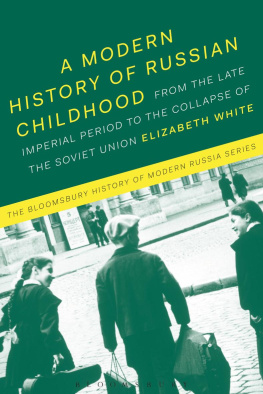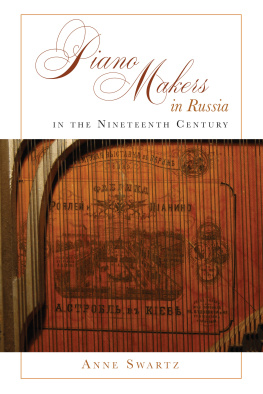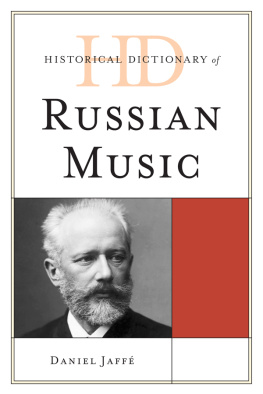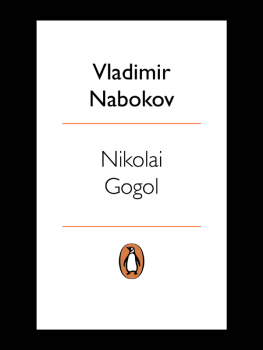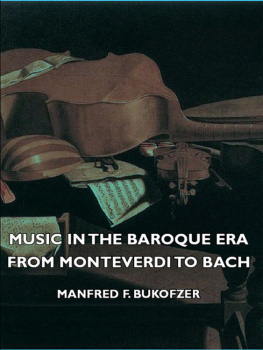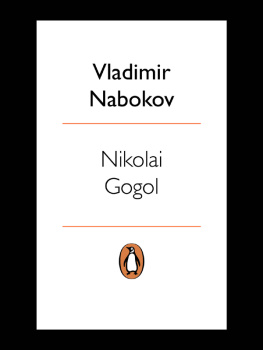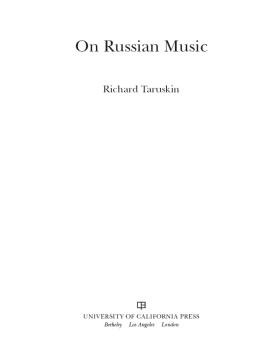History of Music
in Russia from
Antiquity to 1800

NIKOLAI FINDEIZEN (18681928).
History of Music
in Russia from
Antiquity to 1800
VOLUME 1
From Antiquity to the Beginning of the Eighteenth Century
VOLUME 2
The Eighteenth Century
This work was brought to publication with the generous support of Joseph Bloch.
RUSSIAN MUSIC STUDIES
Malcolm Hamrick Brown, founding editor
History of Music
in Russia from
Antiquity to 1800
VOLUME 2
The Eighteenth Century

Nikolai Findeizen
TRANSLATION BY
Samuel William Pring
EDITED AND ANNOTATED BY
Milo Velimirovi and Claudia R. Jensen
WITH THE ASSISTANCE OF
MALCOLM HAMRICK BROWN AND
DANIEL C. WAUGH

This book is a publication of
Indiana University Press
601 North Morton Street
Bloomington, IN 47404-3797 USA
http://iupress.indiana.edu
Telephone orders | 800-842-6796 |
Fax orders | 812-855-7931 |
Orders by e-mail |
2008 by Indiana University Press
All rights reserved
No part of this book may be reproduced or utilized in any form or by any means, electronic or mechanical, including photocopying and recording, or by any information storage and retrieval system, without permission in writing from the publisher. The Association of American University Presses Resolution on Permissions constitutes the only exception to this prohibition.
The paper used in this publication meets the minimum requirements of American National Standard for Information SciencesPermanence of Paper for Printed Library Materials, ANSI Z39.48-1984.
Manufactured in the United States of America
Library of Congress Cataloging-in-Publication Data
Findeizen, N. F. (Nikolai Fedorovich), 18681928.
[Ocherki po istorii muzyki v Rossii. English]
History of music in Russia from antiquity to 1800 / Nikolai Findeizen ; translation by Samuel William Pring ; edited and annotated by Milo Velimirovi and Claudia R. Jensen with the assistance of Malcolm Hamrick Brown and Daniel C. Waugh.
v. cm. (Russian music studies)
Includes bibliographical references and index.
Contents: Vol. 1. From antiquity to the beginning of the eighteenth century. Introduction. The predecessors of the Slavs ; Pagan Rus ; Kievan Rus ; Novgorod the Great ; The activities of the Skomorokhi in Russia ; Music and musical instruments in Russian miniatures, woodcuts, and glossaries ; A survey of old Russian folk instruments ; Music in ancient Moscow (fifteenth and sixteenth centuries) ; Music in the monastery. Chashi (toasts). Bell ringing. Sacred performances (sixteenth and seventeenth centuries) ; Music in court life in the seventeenth century ; A brief survey of singers, composers, and music theorists of the sixteenth and seventeeth centuries ; Music and theater in the age of Peter the Great Vol. 2. The eighteenth century. Music and theater, 17301740 ; Music in court life during the reigns of Elizabeth Petrovna and Catherine II ; Music in Russias domestic life during the second half of the eighteenth century ; The Russian horn band ; Music in Russian public life during the second half of the eighteenth century ; Musical creativity in Russia during the eighteenth century ; Literature about music, publishers and sellers of sheet music, instrument makers and merchants.
ISBN-13: 978-0-253-34825-8 (v. 1 : cloth : alk. paper)
ISBN-13: 978-0-253-34826-5 (v. 2 : cloth : alk. paper) 1. MusicRussiaHistory and criticism. I. Pring, Samuel William. II. Velimirovi, Milo. III. Jensen, Claudia Rae. IV. Title.
ML300.F413 2008
780.947dc22
2006037057
1 2 3 4 5 13 12 11 10 09 08
Book layout and composition: Alcorn Publication Design
These volumes are dedicated, with our thanks, to Joseph Bloch and to Elizabeth (from M.V.) and to Brad, Anna, and Becky (from C.R.J.) for their support and patience throughout.

Contents
Editors Introduction to Volume 2
One of the great pleasures of this project, as we noted in the first volume of this edition, has been the depth of advice and expertise, generously and willingly shared, from which we have been able to draw. Some of the many people to whom we owe our thanks are included in volume 1 of this project, but there are a few whose names must appear in this second volume as well. The patience and much-tried good humor of the others involved in this edition, particularly Joseph Bloch, Malcolm Brown, Daniel Waugh, and Janet Rabinowitch, can only be imagined, and we are most grateful for their support, encouragement, and, most of all, their patience. The quality of this work was immeasurably enriched by several people who worked many long hours answering questions about Russian grammar and vocabulary. Elena Dubinetss heroic work on the translation, for this volume as well as for the first volume, merits our unending thanks; we exploited beyond reason her knowledgeable advice and aid. Dan Newton and Laura Friend both gave many hours to this project, and their exacting sense of language is evident on nearly every page of this text; it was a great pleasure to work with both of them. Galina Averina generously volunteered to help with the long series of eighteenth-century kant texts in this volume, and her thoughtful solutions to these difficult passages made them come alive. Her advice and patience has been invaluable, and we thank her most sincerely. Thanks are also due to Jacqueline Smith, Carolyn Willis, and Nina Perlina, all of whom contributed to our understanding of Findeizens terminology and prose. We also wish to thank Deborah L. Pierce, at the Music Library of the University of Washington, and to acknowledge again the continuing support given by the Department of Slavic Languages and the School of Music. Elizabeth Sander, James West, John Gibbs, and Mikhail Shmidt also gave their expertise to this project. Finally, to George-Julius Papadopoulos, who ignored the clock and finished the Table of Works not only with great style and accuracy but with immense good humor as well, our profound thanks and appreciation; his laborious care gave this volume a reliable, accurate base from which to proceed.
There are many difficult editorial issues to contend with in this second volume of Findeizens work, in addition to the procedures outlined for volume 1. In this volume, names of composers and performers have, whenever possible, been rendered in their original language; thus, in as many instances as possible, we have consulted additional sources in order to find reliable spellings and have used those spellings throughout. We have frequently added first names to some of the musicians Findeizen lists, and these additions do not appear in square brackets, nor do complete titles or page numbers which have been supplied, when possible, in the notes. In certain cases we have suggested possible candidates or spellings for some of Findeizens musicians, and these suggestions, unverified but plausible, do appear in square brackets. Our primary sources include
Next page

